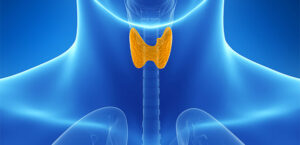Your toothpaste, deodorant, strawberries and plastic water bottles could be contributing to your thyroid dysfunction. These products and more contain chemicals known to disrupt endocrine function and contribute to thyroid disease. It is imperative to keep endocrine disruptors out of our homes and our bodies.
What is an endocrine disruptor?
 The endocrine system is a group of organs linked by a chemical messaging feedback loop. Controlled by the hypothalamus in the brain, the main glands of the endocrine system are the thyroid, the adrenal glands, the ovaries and the testes. You can see from the illustration that there are other glands involved in the system as well. The hypothalamus keeps the system in balance by monitoring and controlling the release of hormones, the chemical messengers of the endocrine system. The glands release more or less of their individual hormones in response to instructions from the hypothalamus. Problems arise when chemical molecules that closely resemble hormones start circulating in the system, interfering with the delicate feedback loops that maintain optimal health. These are endocrine disruptors.
The endocrine system is a group of organs linked by a chemical messaging feedback loop. Controlled by the hypothalamus in the brain, the main glands of the endocrine system are the thyroid, the adrenal glands, the ovaries and the testes. You can see from the illustration that there are other glands involved in the system as well. The hypothalamus keeps the system in balance by monitoring and controlling the release of hormones, the chemical messengers of the endocrine system. The glands release more or less of their individual hormones in response to instructions from the hypothalamus. Problems arise when chemical molecules that closely resemble hormones start circulating in the system, interfering with the delicate feedback loops that maintain optimal health. These are endocrine disruptors.
Chemicals to avoid
Some chemicals that impact the endocrine system and thyroid function are:
Triclosan – An ingredient that was banned from soaps and sanitizers in 2016, but still found in some cosmetic products. Studies have conclusively demonstrated that triclosan interferes with thyroid, estrogen and testosterone function in animals, and strongly suggest the same is true in humans. Here is an excerpt from an article from the American Thyroid Association website expressing concern about the danger of this chemical for everyone, especially pregnant women. “Triclosan is structurally similar to T4, and it is therefore possible that it can interfere with the function of T4 at one or more sites of the thyroid function pathways. Triclosan may potentially result in hypothyroidism in the person who has been directly exposed to it, but it can also potentially indirectly compromise neurodevelopment through placental transfer to the fetus.”
BPA – Found in plastic bottles and home food containers, the lining of food cans, and soft plastic toys. This excerpt from one study indicates multiple pathways of thyroid disruption, with special concern for exposure in the early years of life: “BPA may affect thyroid function through several possible mechanisms of action. First, the main mechanism of action is thought to be binding of BPA to TR and interference with thyroid hormone. However, this review also suggests that BPA can interfere with thyroid hormone synthesis, transport, and metabolism.”
Pesticides – Found in foods that have been sprayed with pesticides. Anything that is not certified organic has pesticides in it – unless you grew it yourself. There is concern that exposure to pollutants such as pesticides increases a person’s risk for thyroid disease, especially for women. An article in Scientific American states, “Researchers have begun to find links between increased risk of thyroid disease and exposure to certain chemicals, especially among women.” The chemicals they are referring to are pesticides, flame retardants, plastics and triclosan.
Flouride – Flouride is found in drinking water and toothpaste. Studies in Canada, the United Kingdom and Iran have shown that increased flouride intake through drinking water has been correlated with decreased thyroid function. This topic is highly controversial because of the positive effect of public water flouridation on dental caries. Is it possible that something can be helpful in one way and harmful in another? Here is an article on the topic from Izabella Wentz, PharmD.
How do I find out if my products are safe?
The Environmental Working Group (EWG) is an excellent resource and consumer guide. You can find lists of products that are safe and flagged as potentially not safe, articles about different chemicals, and you can donate to support their efforts for toxin-free consumables.
What do i do now?
I’ve linked my webinar on thyroid health and homeopathy, and a free handout with thyroid resources, if you’d like to learn more. In the meantime, support your thyroid by eating organic foods, using glass containers to store food, and by reading labels. Your dollars are powerful. Be discerning about what you choose to purchase and consume.





